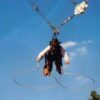Senate picks back up bill to extend apprenticeships to high school students
![]()
Senate picks back up bill to extend apprenticeships to high school students
By:
For the Journal
Post date:
Fri, 04/15/2022 – 10:43am
A way expand opportunities for high school students to go into apprenticeships is getting renewed attention in the Legislature.
House Bill 132, sponsored by Rep. Zack Fields, D-Anchorage, would require the Alaska Department of Labor and Workforce Development and the Alaska Department of Education and Early Development to work with public school districts to develop programs to allow students to complete high school credits and apprenticeships at the same time. Right now, most public school districts offer career and technical education classes such as construction and welding, but this would expand that into apprenticeships in real work environments.
Fields said during a mid-March hearing before the Senate Education Committee that he got the idea from observing how South Carolina built a similar program after realizing it needed more apprenticeship availability to supply the automobile manufacturing industry with skilled workers.
“In South Carolina, they embedded (an apprenticeship program) in the community college system, and they were very successful,” he said. “These are non-union apprenticeships and South Carolina, by putting this tax credit forward, took some risk off the table for employers.”
Apprenticeships are a generally accepted training path for trade occupations such as plumbing and carpentry. They are federally regulated, so apprentices have to register with the U.S. Department of Labor, which oversees requirements for training apprentices. In 2020, there were 1,932 active apprentices registered in Alaska spread across 318 programs, according to the U.S. Department of Labor.
Advertisement
The House passed the bill in its current form during the last Legislative session, in May 2021. The Senate is considering it now, and is working on amendments to it in the Senate Education Committee.
The version of the bill that passed the House instructed the state departments to work with public school districts on the apprenticeships, which would be available to students 14 and older who have completed eighth grade and meet the program requirements. For vocational programs, instructors would have to hold industry standard master skill certification or the equivalent.
The House version also establishes a $1,250 tax credit per apprentice for businesses to incentivize participation. Fields said this is based on the South Carolina model.
The bill has received broad support from trade unions and associations, including the Alaska AFL-CIO, the Associated of General Contractors of Alaska, the Association of Builders and Contractors, the Alaska State Pipe Trades Association, Alaska Ironworkers Local 751, the Alaska State Hospital and Nursing Home Association and the Mat-Su Borough School District, among others. Chris Dimond, the Alaska regional manager for the Pacific Northwest Regional Council of Carpenters, told the Senate Education Committee during an April 11 hearing that the bill could help to meet some of the demand for carpenters. He estimated that 200 to 300 carpenters are needed to fill the jobs on their books right now, and with more infrastructure money likely coming from the federal government soon, he said the need for more trained workers is serious.
The training program could help students figure out what they’re interested in without fully committing, too, he said. Sometimes, new workers have come into the construction industry without fully understanding the demands, and left after a year or so, he said.
“We see a lot of those folks drop out,” he said. “So creating these opportunities for students to be able to get these real-life job experiences to sort of be able to understand what the culture is like, what the physical demands are like, and so forth, I think will be a big help to backfill some of our workforce up here.”
Apprenticeships aren’t just for construction trades, either. The Alaska Primary Care Association, which represents medical providers across the state, has apprentices working in practices everywhere from Barrow to Anchorage, Mari Selle, the chief of staff and Southcentral Alaska Health Education Center interim director, told the Senate Education Committee. In rural Alaska, health care facilities are already training their own employees out of the community.
“In this environment where recruitment and retention in health care has been so difficult and is continuing to be so difficult, this really is an innovative way to recruit and retain workers into this really critical field of health care and human services,” Selle said. “When Alaska has strong state support and strong policies for apprenticeship, it puts us in a better position to garner federal funding.”
Several of the senators expressed support for the core ideas of the bill, but reservations about the tax credit portion. Senate Education members introduced a committee substitute that removed the tax credit provision, among other changes. Fields said he would defer to the Senate’s decision about that section, though the program did have success in the models he’d based it on.
The language about public schools also came up for debate. Senate President Peter Micciche, R-Soldotna, noted that he was concerned about unfairly dividing students into categories based on what type of school their parents enroll them in, and asked about removing the “public” from the bill. Fields responded that his inclination would be to leave the “public” language in. The Legislature has oversight over public schools through the Department of Education and Early Development and appropriates money to support them, but does not do the same for private schools.
Sen. Shelley Hughes, R-Wasilla, agreed with Micciche and said students being privately home-schooled could benefit from these kinds of programs.
“Part of the discussion was that they were pulling kids out of public school because traditional academic learning, book learning, doesn’t necessarily work for their children, that it’s more hands-on,” she said. “So I think there is absolutely a resource of future apprentices and people who would fit this type of work that could be drawn from the private schools and the private home-schools.”
The bill is scheduled for another hearing before the Senate Education Committee on April 20.
Reach Elizabeth Earl at elizabeth




















